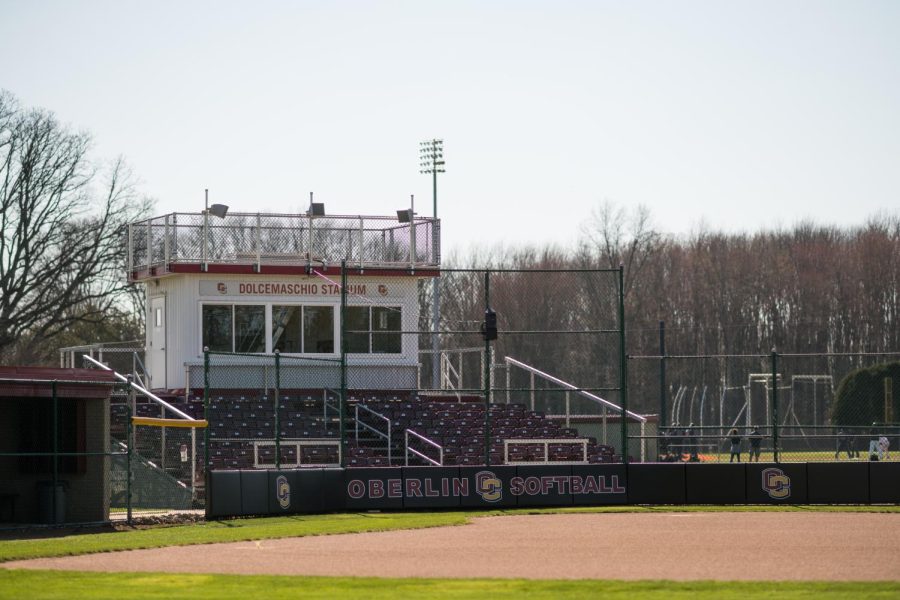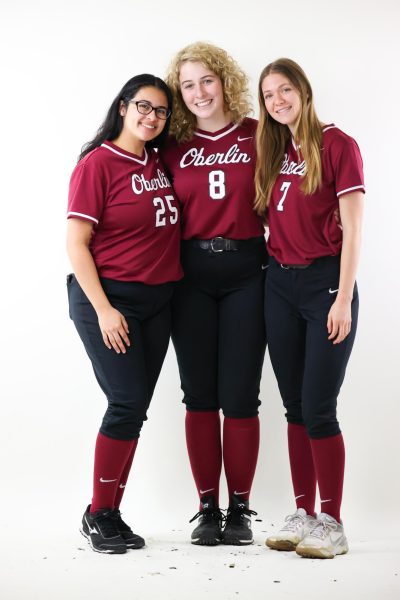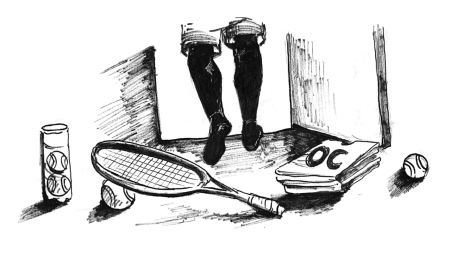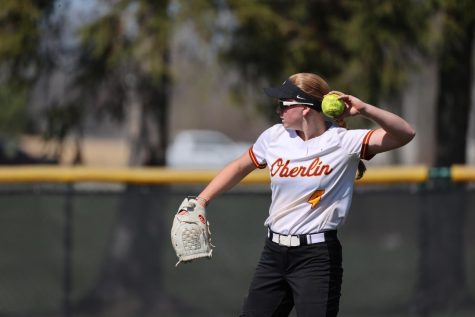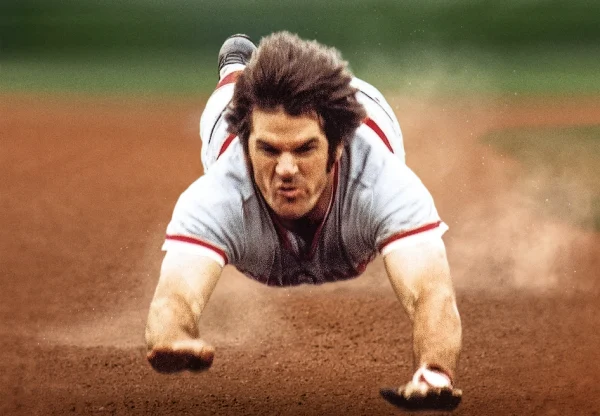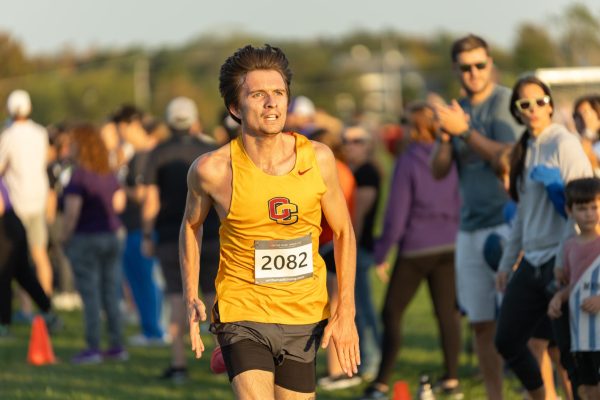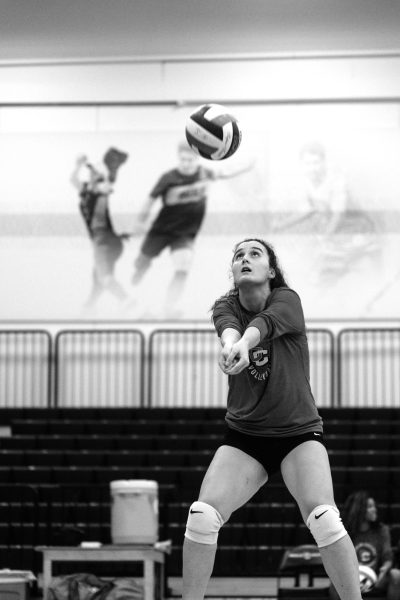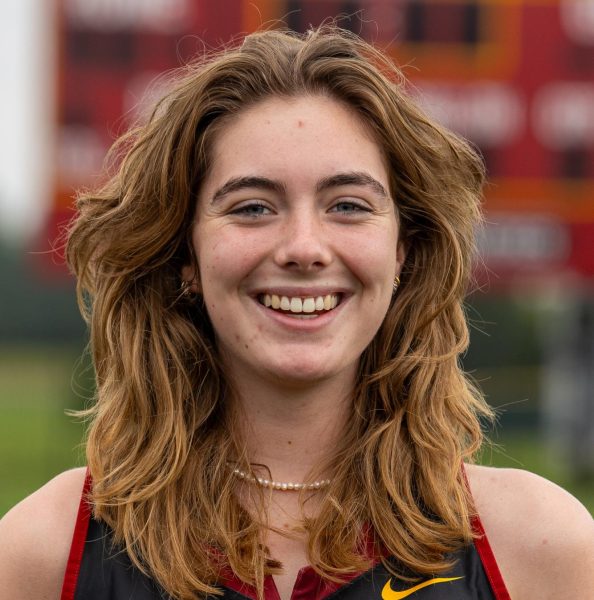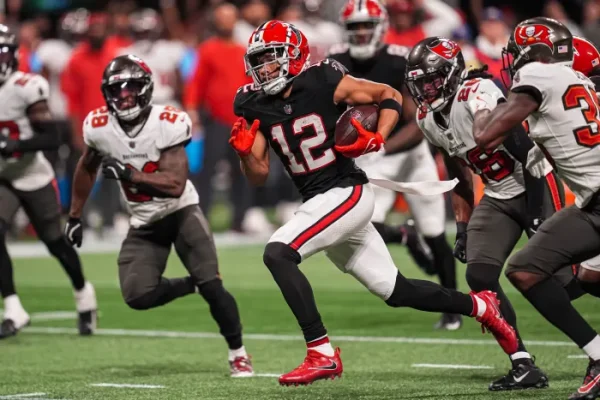One Year Since Racist Experience at Rose-Hulman, Softball Players Find Improved Support
Photo by Abe Frato, Photo Editor
The past year has brought significant change to the softball team.
One year after a racist experience at the Rose-Hulman Institute of Technology, the softball program has undergone several changes, including a new head coach and the utilization of the Multicultural Resource Commons.
As previously reported in the Review, (“Oberlin Softball Players Face Racism from Rose-Hulman,” The Oberlin Review, May 20, 2022), Rose-Hulman players yelled racial taunts at V Dagnino, OC ’22, and third-year Mia Brito during a double-header in Terre Haute, IN. Since the article’s publication, Rose-Hulman confirmed the attacks to the Tribune-Star in an article published June 8 and suspended two players indefinitely from the team. Additionally, it stated that the entire team participated in educational workshops from Rose-Hulman’s Center for Diversity and Inclusion.
“This type of hurtful behavior is unacceptable and does not represent the institute’s values or commitment to treat others with respect, inclusiveness, and sensitivity,” Rose-Hulman’s statement read in the article published by the Tribune-Star. “We have contacted Oberlin College to convey our apologies and continue to stay in close communication with their athletic department.”
Coaching Changes Within Softball
With end-of-year evaluations resuming on Oberlin’s softball team for the first time since the pandemic restrictions shut the Athletics department down entirely for two years, players voiced their concerns at the end of the season about former Head Coach Sara Schoenhoft’s response to the Rose-Hulman incident. Fourth-year Lalli Lopez, who was indirectly affected, said they did not feel comfortable going to Schoenhoft about concerns that they had.
“[It was] just a general feeling of not being treated like an individual and more like a softball player or just like an athlete,” Lopez said. “So it just felt like a really odd relationship where I couldn’t go to her for any problems that I had.”
Brito stated that if there weren’t major changes, she was sure that many of the softball players from that year would not have continued. She also noted that other teams, such as swimming and diving and track and field, stood up for softball in their evaluations.
“We just kind of all had a general understanding that if we had our same coaching staff as we did last year, this year we were going to quit — I would’ve quit,” Brito said. “A couple others would’ve quit and it kind of would’ve been like that chain reaction. … We would’ve all quit — every single one of us. There would not have been a team.”
However, both Brito and Lopez emphasized that they still had respect for their old head coach and understood that Schoenhoft was in a difficult position.
“It was a tough situation,” Brito said. “It doesn’t take away from the fact that we were affected and that it needed to change.”
After receiving the evaluations, Delta Lodge Director of Athletics and Physical Education Natalie Winkelfoos hired Head Coach Julie Pratt, who came from Case Western Reserve University. Pratt started in the role July 2022.
“We are always looking for someone that can be a fit for Oberlin that has a competitive drive, experience with recruiting in a highly academic environment, and can work well within our department and campus community,” Winkelfoos wrote in an email to the Review. “Coach Pratt came to us with an outstanding coaching resume and high-quality referrals from people that are well respected within our industry.”
In addition to Schoenhoft’s departure, former Assistant Coach Lindsay Mapes, who worked at Oberlin since summer 2021 and who Lopez cited as a supportive figure after the Rose-Hulman game, left for a new job and was replaced by Lauren Dockrill. Dockrill worked as a volunteer in the fall and was later promoted to a full-time position in January 2023. Brito said that while the team dynamic was weakened after the Rose-Hulman incident, Pratt has acted as the “glue” of the team and sees the members as people first and softball players second. Lopez also added that the Rose-Hulman game is not what defines their relationship and that Pratt focuses on looking toward the future.
“With our new head coach, I definitely feel so loved and supported,” Lopez said. “We just haven’t talked about it because we just [want to] leave it in the past and just focus on being a new team. … That’s not at the center of what she talks about with us. I am 100 percent certain that she has our backs no matter what.”
In an email to the Review, Pratt expressed her gratitude to the Oberlin community for allowing her to coach and reaffirmed her commitment to the softball program both on and off the field.
“We have a great group of student- athletes who have welcomed me with open arms,” Pratt wrote. “I cannot express how excited I am for this opportunity to be on the field with this team every day. … With our coaching staff ’s leadership, structure and support, we work to prepare our student-athletes for gamedays, academic [perseverance], and the grit required for life after college.”
Schoenhoft now works as the associate director of campus recreation at Oberlin and maintains that she did her best to support her players after the incident, especially after navigating two seasons heavily restricted by the pandemic.
“I have always cared deeply about my players both as humans and student-athletes,” Schoenhoft wrote in an email to the Review. “There have been multiple instances over the course of my career where I provided support far beyond support [what] would be expected of a coach. I am sorry that some players didn’t feel that support last year. I poured every ounce of myself into the softball program and was able to transition into my new position knowing that I gave my absolute best effort to leave the program better than I found it and make a positive impact on the lives of my student- athletes.”
Finding Improved Support On Campus
While the three athletes initially had difficulty finding support on campus immediately after the Rose-Hulman game, Brito utilized the MRC, which had a full staff for the first time since 2020. This fall, she reached out to Assistant Dean and Director of the MRC Scott Hwang to take action if a similar incident happened again, and now works as a program assistant. In this job, she is working to archive stories of marginalized students at Oberlin and working on outreach programs with Assistant Dean for Inclusion and Belonging Chris Donaldson, OC ’97.
“The communication between [Student Athlete Advisory Committee] and the MRC is a lot more than it’s been in the past,” Brito said. “Chris Donaldson especially works with Black men and Latinx men which are minority populations in the athletic community, so just having those open spaces for specifically those people is really valuable. Events that we are working on to push out in the future or more open lines of communication is something that we haven’t had in the past, which has been really helpful.”
Along with the MRC’s work in providing support for non-white student-athletes, Winkelfoos has worked closely in making sure to offer a more effective response if a similar event were to happen, and says that she remains in contact with Rose-Hulman’s head coach.
“Nothing can prepare a person for the unpredictable experience our students and staff had that day at Rose Hulman,” Winkelfoos wrote. “It was an ugly incident that impacted two campuses and many people. Everyone navigated the situation the best they knew how at that moment. Unfortunately, we can’t ensure this won’t happen again but we can promise to do our absolute best to protect and support our student- athletes. We worked with our Athletics Diversity and Inclusion Designee Liaison to the Office of Equity, Diversity, and Inclusion Ana Richardson, OC ’18, to create a process if something like this would, unfortunately, happen again.”
In addition to administrative changes, both Brito and Lopez have credited their teammates for supporting them and respecting their boundaries when it comes to discussing the game, even if they can’t directly relate to what happened.
“A lot of my teammates are white, so they obviously have not experienced racism in the way that Mia or [I] have experienced it,” Lopez said. “But this [was a] really eye-opening experience for them too because they saw firsthand. Afterwards [they were] like, ‘Hey, I’ve got your back now. I’m here for you. I know what to look for now in order to prevent it ever happening to you again. God forbid it does happen again, I’m going to be there for you.’”
Ultimately, one year later, both players are encouraged by the steps taken by the Athletics department, their teammates, their coaching staff, and the MRC in healing and moving on from the game. Brito is appreciative of Winkelfoos’ actions and is hopeful that Oberlin is one step closer in better supporting non-white athletes.
“The general Oberlin community [still has] a lot to go, and I don’t know if we’ll ever be completely there in terms of what we could be doing or should be doing for people of color,” Brito said. “But I think we have made very huge strides since where we were last year, which is awesome. The athletic community has completely turned itself around.”


